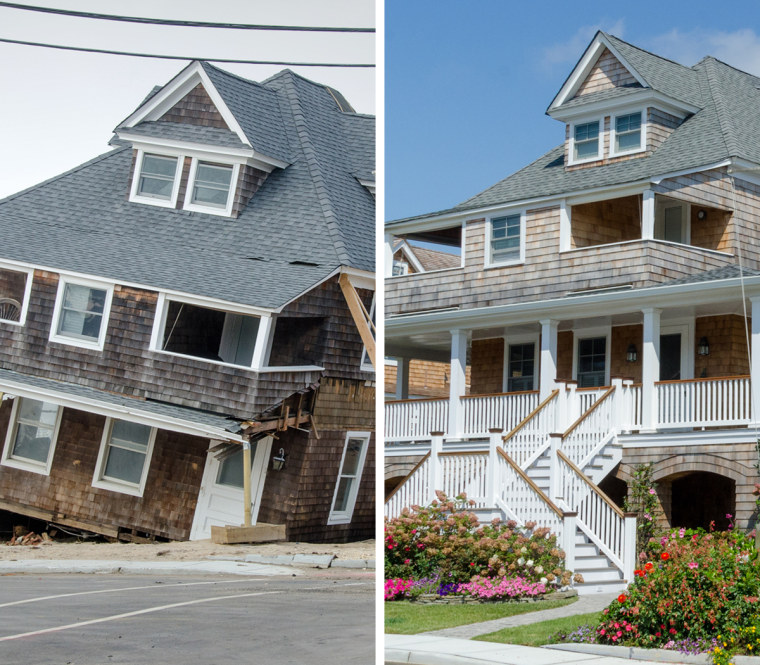This piece has been jointly published by NBCNews.com and The Weather Channel.
Photographer Liz Roll documented the New Jersey coastline for three months after Superstorm Sandy ravaged shore towns. Five years later, weather.com sent her back to the same locations to photograph the changes over time. While many people have rebuilt and the boardwalks are largely restored, empty lots remain and scars from Sandy are still visible.
A yellow house torn in half on Front Street in Union Beach, New Jersey, became an iconic symbol of Superstorm Sandy’s devastation along the New Jersey coast, as did images of Seaside’s “Jet Star” rollercoaster, which plunged into the Atlantic after Casino Pier collapsed in the storm. While a new coaster was built to replace the “Jet Star,” the house didn’t become a success story of New Jersey’s “Restore the Shore” campaign. The Union Beach home, built in 1855, was never rebuilt.
Upon her return to New Jersey shore locations five years after Sandy, FEMA photographer Liz Roll said she didn’t see any remaining damage. However, bayside neighborhoods in Union Beach, a town where about 85 percent of homes were damaged by Superstorm Sandy, remain dotted with vacant lots where families were unable — or chose not — to rebuild.
Sandy made landfall as an enormous post-tropical cyclone near Brigantine, New Jersey, early October 29, 2012, bringing a massive storm surge along the coast, damaging some 346,000 homes in the state. The tropical storm force winds extended 943 miles in diameter, the biggest circulation of any tropical system ever recorded.
Pamela and Bobby Vazquez, of Union Beach, lost their home when Sandy hit. Pamela told Roll hers and Bobby’s survival story back in 2012.
During the storm, the Vazquezes watched their 80-pound Pyrenees, Molly, be taken by the storm surge while the two tried to stay afloat in the floodwaters after their home’s deck collapsed from under them. Already mourning her loss, they were shocked to be reunited with Molly a few hours later, finding her floating on a two-by-four. Their home, however, where the two had planned to retire, was little more than a flooded foundation after the storm passed.
The family moved into their newly rebuilt and elevated home in 2015. It took the family three years years to get back in the home. The family received $32,000 in FEMA aid, and used reclaimed and donated supplies and volunteer labor to rebuild. The Vazquez’s new home is in view of empty lots across the street, where residents were unable to rebuild.
Those who rebuilt or repaired along the New Jersey coast faced the choice of elevating their homes or paying higher insurance rates. The Department of Environmental Protection adopted amendments to its Flood Hazard Area Control Act rule in summer of 2013, mandating that homes within flood zones be elevated according to FEMA regulations if any new construction is to take place.
Business owners in shore towns with tourist attractions were determined to rebuild. The Seaside Heights boardwalk has, for the most part, recovered, and most of Keansburg Amusement Park’s rides have been replaced or repaired.
Keansburg, which opened in 1904, is the oldest amusement park in New Jersey, and home to rides that are more than 80 years old. Owner Hank Gelhaus was most set on restoring the rides, such as the rocket ship rides above. The bumper cars were unable to be salvaged and had to be replaced.
Even homes that sustained little damage, like the Deal home seen above, seemed abandoned after the storm. Whether inaccessible due to the chaotic atmosphere post-Sandy or fear of future storms, this home was boarded up for several months afterwards, but now has new landscaping and appears lived in.
“It was hard. Emotionally, it was really hard,” Roll said about spending months among the storm damage. “After about five or six days I broke down.”
After speaking to a friend she was able to continue her photography work along the Jersey shore, realizing that she was helping people tell their stories of devastating natural disasters and survival.
On Roll’s first day documenting storm damage, she spoke with a woman in Atlantic City whose home was affected by the storm. The woman wasn’t interested in registering for FEMA aid, but Roll told her to think about it some more. Several months later, Roll returned to the same beach.
“I was poking around, looking for sea glass, and a car rolls up, and it’s the same woman,” Roll said. “She said, ‘I need to thank you, because I applied for FEMA aid, and it really helped.'”
Roll said she often feels she’s impinging on people’s privacy while photographing disasters like Superstorm Sandy, but meeting someone who had benefited from her presence and advice solidified the value of her work.
Construction is still ongoing in some shore towns. The restorations have a common goal along the Jersey shore: Residents want to be ready for the next Sandy. The Atlantic City boardwalk is still being replaced, this time with concrete rather than wood, in hopes it will better weather the next storm. Elevated homes are a more common sight. While some communities still grapple with the aesthetics of a sea wall or dunes for storm surge protection, the U.S. Army Corps of Engineers has awarded a $128 million contract for one county for beach replenishment that includes 22-foot high dunes.
With 2017’s devastating storms like Hurricane Maria, Irma and Harvey, coastal communities along the Atlantic continue to hold their breath and hope that their preparations will keep homes and citizens safe.
Pamela and Bobby Vazquez had each of the volunteers that helped with their new home write a note or letter. They then placed the notes in bottles and put them in the new foundation as the concrete was poured, creating a sort of time capsule.
“I’ve never read those notes,” Pamela shared. “And I’m hoping I never have to read those notes.”
